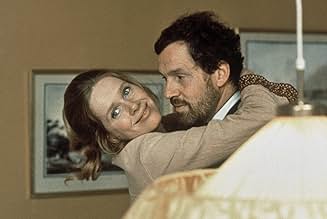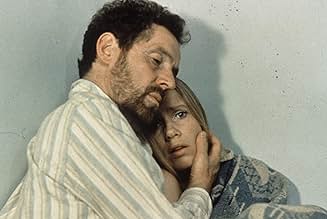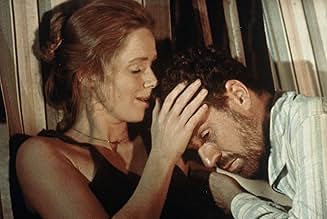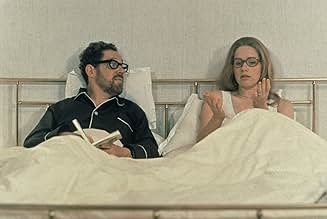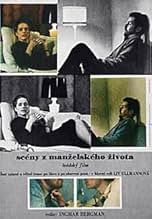IMDb RATING
8.5/10
18K
YOUR RATING
Ten years within the marriage of Marianne and Johan.Ten years within the marriage of Marianne and Johan.Ten years within the marriage of Marianne and Johan.
- Awards
- 3 wins total
Browse episodes
Featured reviews
Enormous success it had with audiences of Swedish TV, where it was shown in six episodes paved way for its theatrical release. This however called for compromising almost half the original length of celluloid.
As one of more easily understandable Bergman films, "Scenes From A Marriage" met much enthusiasm on both sides of the Atlatic.
The film showcases great two of Ingmar Bergman's favorite actors. Both Liv Ullman and Erland Josephson give lively mature performances, lauded by critics.
Being a down-to-earth family drama with strong social commentary of great relevance, "Scenes From A Marriage" has something important to convey. It is a meaningful picture.
It reflects on the nature of relationship between man and woman. It invites us to ponder on this basic issue, a cornerstone of human society Although not quite in the same league with bona-fide Bergman classics like "The Seventh Seal" and "Persona", "Scenes From A Marriage" remains a powerful movie.
As one of more easily understandable Bergman films, "Scenes From A Marriage" met much enthusiasm on both sides of the Atlatic.
The film showcases great two of Ingmar Bergman's favorite actors. Both Liv Ullman and Erland Josephson give lively mature performances, lauded by critics.
Being a down-to-earth family drama with strong social commentary of great relevance, "Scenes From A Marriage" has something important to convey. It is a meaningful picture.
It reflects on the nature of relationship between man and woman. It invites us to ponder on this basic issue, a cornerstone of human society Although not quite in the same league with bona-fide Bergman classics like "The Seventh Seal" and "Persona", "Scenes From A Marriage" remains a powerful movie.
I used to think that I knew a thing or two about marriage having been married for as long as I have but nothing from my experience had prepared me for the merciless and deep dissection of Marriage: Bergman Style. When we meet Johan and Marianne for the first time, they have been happily (or so it seems) married for ten years. They have two daughters; they are still young, very attractive, healthy, educated, well off, and they seem to love each other very much. But Bergman is not interested in happy families all happy families are happy in the similar ways. Like Tolstoy many years before him, Bergman explores the second part of the formula All unhappy families are unhappy in their unique ways.
Bergman and his leading actors Liv Ullmann and Arland Josephson give one of the most truthful, honest, heartbreaking and credible portraits of a couple, one of the most intense character studies ever done on film. For five hours, we share twenty years from the lives of Johan and Marianne as well as their love, hate, misunderstandings, insecurities, anger, jealousy, denial, sadness, pain, despair, and loss. We witness the moments of incredible tenderness and unexpected and shocking violence, both physical and mental. There are no depth that they have not descended in the search of themselves and the meaning of their relationship.
There are actually four marriages Bergman studies in "Scenes from a Marriage" none of them is happy, all are miserable. Bergman does not deny the possibility of finding a soul mate but his opinion on the modern marriage is quite pessimistic.
It felt like Bergman was saying - marriage is dead, long live love. For hours after the film was over, I could not shake off the sadness and pessimism of it. Only later I realized that even if four marriages in Bergman's film were disastrous, it does not necessarily mean that all couples in the world are or have to be that miserable. Bergman wrote and directed Scenes from a Marriage in 1973 when he was in his 5-th marriage, the one that would last for 24 years until his wife died. He brought in the screenplay (I think so but I may be wrong) the bitterness, resentment, anger and disappointments from his previous four marriages - maybe that's why the film is sometimes almost impossible to watch?
"Scenes from a Marriage" is a masterpiece but it may leave you devastated and emotionally exhausted. I watched the original 5-hours TV version and did not even bother with three hours version. 10/10
Bergman and his leading actors Liv Ullmann and Arland Josephson give one of the most truthful, honest, heartbreaking and credible portraits of a couple, one of the most intense character studies ever done on film. For five hours, we share twenty years from the lives of Johan and Marianne as well as their love, hate, misunderstandings, insecurities, anger, jealousy, denial, sadness, pain, despair, and loss. We witness the moments of incredible tenderness and unexpected and shocking violence, both physical and mental. There are no depth that they have not descended in the search of themselves and the meaning of their relationship.
There are actually four marriages Bergman studies in "Scenes from a Marriage" none of them is happy, all are miserable. Bergman does not deny the possibility of finding a soul mate but his opinion on the modern marriage is quite pessimistic.
It felt like Bergman was saying - marriage is dead, long live love. For hours after the film was over, I could not shake off the sadness and pessimism of it. Only later I realized that even if four marriages in Bergman's film were disastrous, it does not necessarily mean that all couples in the world are or have to be that miserable. Bergman wrote and directed Scenes from a Marriage in 1973 when he was in his 5-th marriage, the one that would last for 24 years until his wife died. He brought in the screenplay (I think so but I may be wrong) the bitterness, resentment, anger and disappointments from his previous four marriages - maybe that's why the film is sometimes almost impossible to watch?
"Scenes from a Marriage" is a masterpiece but it may leave you devastated and emotionally exhausted. I watched the original 5-hours TV version and did not even bother with three hours version. 10/10
Scenes from a Marriage is a film about a breakup. We are not talking about some ephemeral youthful relationship, but a happy marriage of many years between a couple who truly feel they are happy together.
Yet cracks become visible, and soon the whole structure comes tumbling down as the once happy couple spends the next 15 years of their lives trying to make sense of it all. The film (aired in Sweden as a 6 part miniseries) is 5 hours of the most intense, painful, emotional conversations ever committed to celluloid. It is filmed almost entirely in close-up with sparse lighting and no music. I have watched it multiple times and by the end of the emotionally grueling experience it feels as though you have lived through each moment Johan and Marianne have experienced, no matter how far from your actual life any one detail might be.
That may not seem like the most pleasant viewing experience, but I should add that the film is not quite as harrowing as my description might make it seem. Yes, intense doesn't even begin to describe it, but Bergman has created the film with such honesty that there is no manipulation or unnecessary suffering. Even the immortal Eric Rohmer has never displayed this level of understanding into basic human relationships. Again, there is no manipulation here; Bergman would never stoop so low as to include suffering merely for the sake of additional drama. What is actually present in every second of the film is simply many lifetimes worth of wisdom on love, loss and moving on.
There are no easy answers in Scenes from a Marriage. The film is an emotional roller-coaster from start to finish. The person who is handling things the best will just as often have hit a new low when they are revisited down the road. The couple's bond will never disappear and yet they can never be what they were to each other. Old feelings resurface, old wounds reopen, old passions return and throughout it all Sven Nykvist's camera does not flinch. No film has done more with such a stark palate of images.
What elevates the film to "second favorite movie ever" level for me is not just the insight into human interaction, though that is my favorite subject matter in film. Scenes from a Marriage is not content to merely show what the loss of a loved one is like, Bergman also has a point beyond a simple documentation of the dissolution of a marriage.
By the final chapter, perfectly titled "In the Middle of the Night in a Dark House Somewhere in the World", an epiphany is reached. Johan and Marianne do not necessarily "get back together" or "never see each other again", but a certain level of acceptance is reached. That which can never be understood, which no one can put into words, and which has no solution is somehow grasped in the final scenes of this magnificent movie. Like a fleeting glimpse of the sun from inside a cave, all the mysteries of life and love briefly make sense.
While I never leave a viewing of Scenes from a Marriage feeling any less confused about the grand questions of life, I can't help but suspect that for a time during its brief 5 hours I almost had it. What more could any artist want from their viewer?
Yet cracks become visible, and soon the whole structure comes tumbling down as the once happy couple spends the next 15 years of their lives trying to make sense of it all. The film (aired in Sweden as a 6 part miniseries) is 5 hours of the most intense, painful, emotional conversations ever committed to celluloid. It is filmed almost entirely in close-up with sparse lighting and no music. I have watched it multiple times and by the end of the emotionally grueling experience it feels as though you have lived through each moment Johan and Marianne have experienced, no matter how far from your actual life any one detail might be.
That may not seem like the most pleasant viewing experience, but I should add that the film is not quite as harrowing as my description might make it seem. Yes, intense doesn't even begin to describe it, but Bergman has created the film with such honesty that there is no manipulation or unnecessary suffering. Even the immortal Eric Rohmer has never displayed this level of understanding into basic human relationships. Again, there is no manipulation here; Bergman would never stoop so low as to include suffering merely for the sake of additional drama. What is actually present in every second of the film is simply many lifetimes worth of wisdom on love, loss and moving on.
There are no easy answers in Scenes from a Marriage. The film is an emotional roller-coaster from start to finish. The person who is handling things the best will just as often have hit a new low when they are revisited down the road. The couple's bond will never disappear and yet they can never be what they were to each other. Old feelings resurface, old wounds reopen, old passions return and throughout it all Sven Nykvist's camera does not flinch. No film has done more with such a stark palate of images.
What elevates the film to "second favorite movie ever" level for me is not just the insight into human interaction, though that is my favorite subject matter in film. Scenes from a Marriage is not content to merely show what the loss of a loved one is like, Bergman also has a point beyond a simple documentation of the dissolution of a marriage.
By the final chapter, perfectly titled "In the Middle of the Night in a Dark House Somewhere in the World", an epiphany is reached. Johan and Marianne do not necessarily "get back together" or "never see each other again", but a certain level of acceptance is reached. That which can never be understood, which no one can put into words, and which has no solution is somehow grasped in the final scenes of this magnificent movie. Like a fleeting glimpse of the sun from inside a cave, all the mysteries of life and love briefly make sense.
While I never leave a viewing of Scenes from a Marriage feeling any less confused about the grand questions of life, I can't help but suspect that for a time during its brief 5 hours I almost had it. What more could any artist want from their viewer?
Scenes from a Marriage (the TV version, even as the theatrical cut is still very good and worth the time if the only copy available) is an intimate, naturalistic portrait of a couple, who at first are seemingly happy, then aren't, then try and find out where they go wrong. It's involving drama at its nexus, and for those who love the theater it's an absolute must see (aside from the theme, no music, all talk). Johan and Marianne are two of Bergman's most interesting, true characters (among his countless others) that he's ever presented, and like many other film artists, you can tell he's lived through at least some if not most of the emotions and trials these characters have been through.
Along with several supporting characters, two of the more notable ones played by Bibi Andersson and Malmjso are a perfect contrast in the first episode of the series. The conflicts that are established throughout the series never pay-off in a mis-fire. Craft-wise there is almost no style except for the minimal lighting by the great Sven Nykvist. And the dialog that goes on between the two leads goes from amusing to tragic, from romantic to bleak, and with all the emotions that I (as one who's never been married) can only guess can be as so. Bergman's script would be just that, a poignant, very profound lot of bits between two people more or less on paper, if not for Liv Ullmann and Erland Josephson. They turn on the emotions intuitively, like they've been these people somewhere else at some other time. Or rather, the husband and wife don't have very complicated jobs or economic situation, but the problems lie on the emotional plane, and the intellect they try to put to it. Johan loves another woman, how does that affect Marianne? Marianne asks for a divorce, how does that affect Johan? What will they do to cope? These are questions Bergman poses for his actors, among plenty of others, and they pull off the emotional cues off of each other like the most wonderful theatrical pros.
It's hard to find anything wrong with their acting, cause they don't over-do it (unless you're not into Marianne's changes in feeling in some scenes, which could be understandable), and the bottom line is that despite it being in Europe thirty years ago, it's highly possible these people could be in your house, or in your neighbor's house. Ullmann's Marianne is the 180 of her character from Persona, who could only let out emotions once or twice, mostly as an observer. Josephson's Johan is complex behind is usually sarcastic and simple demeanor- what drives him to do what he does in episode three, or in four? What will the conclusion lead to? Bergman creates a drama that is never boring, never diluted, and asks us to search for ideas about love and relationships we sometimes try and push away. It's a superb, concise treatise about the nature of falling in and out of love, how to differentiate what love is, and essentially what a marriage is. I can't wait to see the sequel, Saraband, which is Bergman's (definite) last film.
Along with several supporting characters, two of the more notable ones played by Bibi Andersson and Malmjso are a perfect contrast in the first episode of the series. The conflicts that are established throughout the series never pay-off in a mis-fire. Craft-wise there is almost no style except for the minimal lighting by the great Sven Nykvist. And the dialog that goes on between the two leads goes from amusing to tragic, from romantic to bleak, and with all the emotions that I (as one who's never been married) can only guess can be as so. Bergman's script would be just that, a poignant, very profound lot of bits between two people more or less on paper, if not for Liv Ullmann and Erland Josephson. They turn on the emotions intuitively, like they've been these people somewhere else at some other time. Or rather, the husband and wife don't have very complicated jobs or economic situation, but the problems lie on the emotional plane, and the intellect they try to put to it. Johan loves another woman, how does that affect Marianne? Marianne asks for a divorce, how does that affect Johan? What will they do to cope? These are questions Bergman poses for his actors, among plenty of others, and they pull off the emotional cues off of each other like the most wonderful theatrical pros.
It's hard to find anything wrong with their acting, cause they don't over-do it (unless you're not into Marianne's changes in feeling in some scenes, which could be understandable), and the bottom line is that despite it being in Europe thirty years ago, it's highly possible these people could be in your house, or in your neighbor's house. Ullmann's Marianne is the 180 of her character from Persona, who could only let out emotions once or twice, mostly as an observer. Josephson's Johan is complex behind is usually sarcastic and simple demeanor- what drives him to do what he does in episode three, or in four? What will the conclusion lead to? Bergman creates a drama that is never boring, never diluted, and asks us to search for ideas about love and relationships we sometimes try and push away. It's a superb, concise treatise about the nature of falling in and out of love, how to differentiate what love is, and essentially what a marriage is. I can't wait to see the sequel, Saraband, which is Bergman's (definite) last film.
There are few other films that have the direct authenticity of this one. It is very frank, honest, tender, and heartbreaking. The performances of the two primary actors are amazing. Never once did I doubt their sincerity. In every single scene they overwhelmingly conveyed the intense and nuanced emotions of the couple. I use the word "overwhelmingly" because that is exactly what it is. At times it is hard to watch. Especially the scene in which Johan admits his infidelity. I could feel Marainne's hurt/anger/confusion. There are moments of intense tenderness, as in the last scene where Johan comforts Marianne after her nightmare. To be sure, the actors had some incredible material with which to work. Bergman knows human nature as much as any of modern writer. His dialog is poetic at times, and achingly authentic at others. They way the couple eviscerates and dissects each other is alarmingly, yet honest. Rarely is a character saying what they actually feel. Rarely do the characters know what they feel. They, like many people, really are "emotional illiterates." Bergman's direction is minimal, and that is what makes it so effective. The emphasis is completely on the characters and their existences. This is a powerful, evocative film. And I have seen only the theatrical version. I can imagine the full TV version is even more detailed.
Did you know
- TriviaAccording to an interview with Ingmar Bergman, after the TV mini-series was broadcast in Sweden, the divorce rate in Sweden increased substantially and the number of married couples who seek marriage counseling also doubled.
- Crazy creditsThe end credits aren't shown on-screen but read by director and writer Ingmar Bergman, while "a beautiful picture of Fårö" is shown (different for each episode). Bergman himself is not credited at all.
- Alternate versionsBergman prepared a four-hour version of "Scenes from a Marriage," hoping it would be shown as a two-part film. It never appeared in the US, although the original six-hour mini-series was shown on PBS after the 168 minute cut had played theatrically.
- ConnectionsEdited into Scenes from a Marriage (1974)
- SoundtracksConcerto for violin, strings & continuo in B flat major, Op. 10, No. 1
(uncredited)
Written by Tomaso Albinoni
A short extract is played during the very beginning and end of each episode (it's not featured in the theatrical version)
- How many seasons does Scenes from a Marriage have?Powered by Alexa
Details
- Release date
- Country of origin
- Official site
- Language
- Also known as
- Szenen einer Ehe
- Filming locations
- Production company
- See more company credits at IMDbPro
- Runtime
- 50m
- Sound mix
- Aspect ratio
- 4:3
Contribute to this page
Suggest an edit or add missing content

